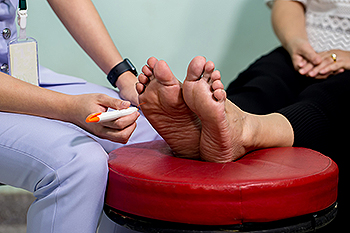
Diabetics frequently end up with a condition known as peripheral neuropathy, which is a type of nerve damage that affects the toes and feet, as well as other extremities. Its most common symptom is shooting pain, along with tingling, burning, and numbness. Diabetic peripheral neuropathy can also affect balance and coordination, increasing the risk of falls. People who have had diabetes for 25 years or more and those who are unable to control their blood sugar levels are most susceptible to developing neuropathy. There is no known cure for this condition, but it can be treated. Managing blood sugar levels is the paramount treatment, followed by pain management with certain medications. Lifestyle changes, such as losing weight, ceasing alcohol intake, and stopping smoking are other effective ways to lessen the discomfort of diabetic neuropathy. Experts also recommend a daily exercise regime. If you are experiencing symptoms of diabetic peripheral neuropathy, please consult a podiatrist who can offer a treatment plan that is appropriate for you.
Neuropathy
Neuropathy can be a potentially serious condition, especially if it is left undiagnosed. If you have any concerns that you may be experiencing nerve loss in your feet, consult with one of our podiatrists from Sutera and Jones Surgical Podiatry. Our doctors will assess your condition and provide you with quality foot and ankle treatment for neuropathy.
What Is Neuropathy?
Neuropathy is a condition that leads to damage to the nerves in the body. Peripheral neuropathy, or neuropathy that affects your peripheral nervous system, usually occurs in the feet. Neuropathy can be triggered by a number of different causes. Such causes include diabetes, infections, cancers, disorders, and toxic substances.
Symptoms of Neuropathy Include:
- Numbness
- Sensation loss
- Prickling and tingling sensations
- Throbbing, freezing, burning pains
- Muscle weakness
Those with diabetes are at serious risk due to being unable to feel an ulcer on their feet. Diabetics usually also suffer from poor blood circulation. This can lead to the wound not healing, infections occurring, and the limb may have to be amputated.
Treatment
To treat neuropathy in the foot, podiatrists will first diagnose the cause of the neuropathy. Figuring out the underlying cause of the neuropathy will allow the podiatrist to prescribe the best treatment, whether it be caused by diabetes, toxic substance exposure, infection, etc. If the nerve has not died, then it’s possible that sensation may be able to return to the foot.
Pain medication may be issued for pain. Electrical nerve stimulation can be used to stimulate nerves. If the neuropathy is caused from pressure on the nerves, then surgery may be necessary.
If you have any questions, please feel free to contact one of our offices located in Media, Glen Mills, Riddle Memorial Hospital, and Concordville, PA . We offer the newest diagnostic and treatment technologies for all your foot care needs.
